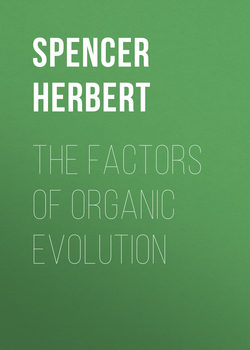The Factors of Organic Evolution

Реклама. ООО «ЛитРес», ИНН: 7719571260.
Оглавление
Spencer Herbert. The Factors of Organic Evolution
I
II
Note
Отрывок из книги
Within the recollection of men now in middle life, opinion concerning the derivation of animals and plants was in a chaotic state. Among the unthinking there was tacit belief in creation by miracle, which formed an essential part of the creed of Christendom; and among the thinking there were two parties, each of which held an indefensible hypothesis. Immensely the larger of these parties, including nearly all whose scientific culture gave weight to their judgments, though not accepting literally the theologically-orthodox doctrine, made a compromise between that doctrine and the doctrines which geologists had established; while opposed to them were some, mostly having no authority in science, who held a doctrine which was heterodox both theologically and scientifically. Professor Huxley, in his lecture on “The Coming of Age of the Origin of Species,” remarks concerning the first of these parties as follows: —
Of the party above referred to as not satisfied with this conception described by Professor Huxley, there were two classes. The great majority were admirers of the Vestiges of the Natural History of Creation– a work which, while it sought to show that organic evolution has taken place, contended that the cause of organic evolution, is “an impulse” supernaturally “imparted to the forms of life, advancing them, … through grades of organization.” Being nearly all very inadequately acquainted with the facts, those who accepted the view set forth in the Vestiges were ridiculed by the well-instructed for being satisfied with evidence, much of which was either invalid or easily cancelled by counter-evidence, and at the same time they exposed themselves to the ridicule of the more philosophical for being content with a supposed explanation which was in reality no explanation: the alleged “impulse” to advance giving us no more help in understanding the facts than does Nature's alleged “abhorrence of a vacuum” help us to understand the ascent of water in a pump. The remnant, forming the second of these classes, was very small. While rejecting this mere verbal solution, which both Dr. Erasmus Darwin and Lamarck had shadowed forth in other language, there were some few who, rejecting also the hypothesis indicated by both Dr. Darwin and Lamarck, that the promptings of desires or wants produced growths of the parts subserving them, accepted the single vera causa assigned by these writers – the modification of structures resulting from modification of functions. They recognized as the sole process in organic development, the adaptation of parts and powers consequent on the effects of use and disuse – that continual moulding and re-moulding of organisms to suit their circumstances, which is brought about by direct converse with such circumstances.
.....
Once more there are the phenomena of mimicry. Perhaps in a more striking way than any others, these show how traits which seem inexplicable are explicable as due to the more frequent survival of individuals that have varied in favorable ways. We are enabled to understand such marvelous simulations as those of the leaf-insect, those of beetles which “resemble glittering dew-drops upon the leaves;” those of caterpillars which, when asleep, stretch themselves out so as to look like twigs. And we are shown how there have arisen still more astonishing imitations – those of one insect by another. As Mr. Bates has proved, there are cases in which a species of butterfly, rendered so unpalatable to insectivorous birds by its disagreeable taste that they will not catch it, is simulated in its colors and markings by a species which is structurally quite different – so simulated that even a practiced entomologist is liable to be deceived: the explanation being that an original slight resemblance, leading to occasional mistakes on the part of birds, was increased generation after generation by the more frequent escape of the most-like individuals, until the likeness became thus great.
But now, recognizing in full this process brought into clear view by Mr. Darwin, and traced out by him with so much care and skill, can we conclude that, taken alone, it accounts for organic evolution? Has the natural selection of favourable variations been the sole factor? On critically examining the evidence, we shall find reason to think that it by no means explains all that has to be explained. Omitting for the present any consideration of a factor which may be distinguished as primordial, it may be contended that the above-named factor alleged by Dr. Erasmus Darwin and by Lamarck, must be recognized as a co-operator. Utterly inadequate to explain the major part of the facts as is the hypothesis of the inheritance of functionally-produced modifications, yet there is a minor part of the facts, very extensive though less, which must be ascribed to this cause.
.....